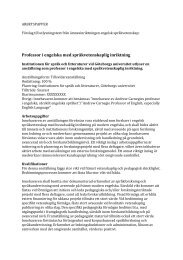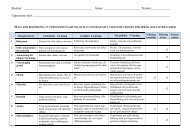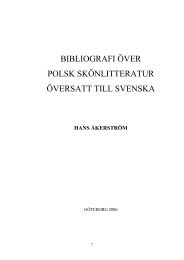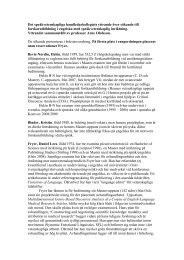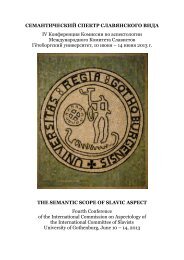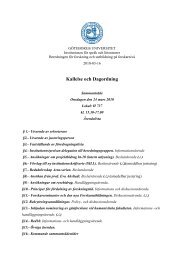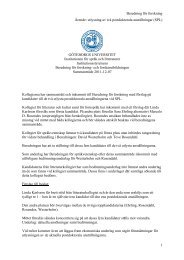Participants
Participants
Participants
- No tags were found...
Create successful ePaper yourself
Turn your PDF publications into a flip-book with our unique Google optimized e-Paper software.
SSSA13Invited speakers1. Yuri D. Apresyan (member of the Russian Academy of Sciences, Moscow)Грамматика глагола в Активном словаре русского языка[The grammar of the verb in the Active Dictionary of the Russian language].2. Stephen M. Dickey (Department of Slavic Languages and Literatures, University ofKansas).Verbs of Motion and the Early History of Slavic Verbal Aspect.3. Östen Dahl (Department of general linguistics, University of Stockholm)A construction approach to perfectivization in Slavic.4. Yelena V. Paducheva (Russian Academy of Sciences, Moscow)Русский глагол БЫТЬ: употребления в значении совершенного вида.[The Russian verb BE: Its uses as a perfective verb].Session presentations1. Peter Arkadiev (Institute of Slavic Studies of the Russian Academy of Sciences, Moscow)Towards an areal typology of prefixal perfectivization.2. Viktor Bayda (Faculty of Philology, Lomonosov Moscow State University)Ирландский хабитуальный прогрессив и русский несовершенный вид:контрастивный анализ.[The Russian Imperfective and the Irish Habitual Progressive: a Contrastive Analysis].3. Adria(a)n Barentsen, René Genis, Magda van Duijkeren-Hrabová, Janneke Kalsbeek,Radovan Lučić (Universiteit van Amsterdam)Вопросы сопоставительного изучения случаев ограниченной кратности.[Problems concerning the comparative analysis of examples of bounded repetition].4. Katja Brančkakec (Charles University, Prague)Aspect and Tense usage in Upper Sorbian and Czech Narrative Texts.5. Walter Breu (Fachbereich Sprachwissenschaft, Universität Konstanz)Функции настоящего и имперфекта СВ и перфекта НСВ в молизско-славянскомязыке.[Functions of the perfective present, perfective imperfect and imperfective perfect tensesin Molise Slavic].6. Elena Čekalina (Faculty of Philology, Lomonosov Moscow State University)Русский вид и видо-временные системы английского и шведского языков.[Russian aspect and the aspect-time systems of English and Swedish languages].
7. Oksana Čujkova. (Institute for Linguistic Studies, Russian Academy of Sciences (ILIRAN), Dept. of Functional Linguistic; Maksim Fedotov (Dept. of Languages of Russia)On some features of “delimitative” verbs in Russian.8. Aleksandra Derganc (Philosophic Faculty, Ljubljana University)Историческое наcтоящее и глагольный вид в словенском языке.[Historical present and verbal aspect in the Slovenian language].9. Hanne Eckhoff and Dag Haug (Faculty of Humanities, University of Oslo)Aspect and prefixation in Old Church Slavonic.10. Valentina Gavrilova (Moscow Pedagogical University)К вопросу о связи категорий вида и залога в спряжении русского глаголa.[On the connection between aspect and voice in the Russian verb conjugation].11. Marina Glovinskaja (Russian Language Institute, Russian Academy of Sciences, Moscow)Глаголы слыхать – услыхать, слышать – услышать. Семантическая иаспектуальная характеристика.[Verbs slyhat’- uslyhat’, slyshat’ – uslyshat’ (hear). Semantic and aspectualcharacteristics].12. Elena Gorbova (Dept. of Linguistics, Saint Petersburg State University)Перфектная семантика в русском языке и семантика перфекта в испанском.[Perfective semantics in Russian and semantics of perfect in Spanish].13. Atle Grønn (Faculty of Humanities, University of Oslo)The factual imperfective in Russian and the role of past tense.14. Alina Israeli (Dep. of Language and Foreign Studies, American University, WashingtonD.C.)Перформативы и вид глагола в русском языке.[Performatives and verbal aspect in Russian].15. Kira Ivanova, Maria Voeikova (Institute for Linguistic Studies, Russian Academy ofSciences, St Petersburg)Императивные формы НСВ на ранних этапах усвоения русского языка детьми:частотность и значение.[Imperfective imperatives in early phases of the acquisition of Russian by children:frequency and semantics].16. Folke Josephson (Faculty of Humanities, University of Gothenburg)Grammaticalisation paths of verbal affixes in Slavic and other IE subgroups.17. Yuriko Kaneko (Iwate University)Aspect-Tense alternation in narrative texts of Russian and Japanese.
18. Mitsushi Kitajo (Dept. of Linguistics, Kyoto Sangyo University)Анализ вида глагола и полных/кратких форм прилагательных с точки зрениявежливости.[Analysis of verbal aspect and full/short forms of adjectives from the point of view ofpoliteness].19. Vladimir Klimonov (Humboldt-Universität zu Berlin)Грамматикализация глагольного вида и преобразования в системе видовыхпарадигм в русском языке.[Grammaticalization of verbal aspect and changes in the system of aspectualparadigms in Russian].20. Juriy Knjazev (Dept. of Russian Language, St Petersburg State University)Источники неограниченно-кратной интерпретации несовершенного вида в русскомязыке: лексическое значение, способ действия, синтаксис.[Sources of unlimited-iterative interpretation of imperfective aspect in Russian: lexicalmeaning, actionsart, syntax].21. Jukari Konuma (Dept. of Linguistics, St Petersburg State University)Акциональные классификация русских и японских глаголов.[Actional classification of Russian and Japanese verbs].22. Izabela Kozera UJ(Institute of Eastern Slavonic Studies of the Jagiellonian University,Krakow)Видовая принадлежность вторичного имперфектива и его аспектуальнаяхарактеристика в свете семантической концепции вида.[Secondary Imperfective and its aspectual characteristics in the framework of thesemantic concept of aspect].23. Volkmar Lehmann (Institut für Slavistik, Universität Hamburg)О соотношении между неэпизодическими/нелокализованными, итеративными ивсемременными/вревременными ситуациямию[On the relation between nonepisodic/nonlocalized, iterative, and omnitemporalsituations].24. Natalia Medynska (University of Rovno)Глаголы распределительного и многократно-дистрибутивного действия сприставкой пере- в современном русском и украинском языках.[Verbs of distributive and multiple-distributive action with the prefix pere- in modernRussian and Ukrainian].25. Hans Robert Mehlig (University of Kiel)Неисчисляемая собирательность в области глагольных предикатов.О конативности в русском языке.[Non-countable collectives in the domain of verbal predicates. About “conativity” inRussian].
26. Tatiana Milliaressi (l'Université Lille 3, France)О соотношении семантических категорий вида и предшествования в русскомязыке.[On the relation between the semantic categories of aspect and anteriority in Russian].27. Ekaterina Mišina (V.V. Vinogradov Russian Language Institute of the Russian Academyof Sciences, Moscow)Об особом употреблении форм совершенного вида в отрицательном контексте(на материале ранних восточнославянских памятников).[On a special use of perfective aspect forms in negative contexts (on the basisof early East Slavic manuscripts].28. Olav Mueller-Reichau (Institut für Slavistik, Universität Leipzig)Общефактическое значение и фоновое знание.[Factual imperfectives and background knowledge].29. Iskra Panovska-Dimkova ("Blaže Koneski" Faculty of Philology, “Cyril and Methodius”University, Skopje)Семантиката на префиксите во лимитативната видска (аспектна) конфигурација вомакедонскиот јазик.[The semantics of the prefixes in the limitative aspectual configuration in Macedonian].30. Elena Pčelinceva (Dept. of Linguistics and Ukrainian Language. CherkassyTechnological University)Отглагольные имена действия и формирование глагольного вида в русском языке.[Nomina actionis and formation of verbal aspect in Russian].31. E. Petrukhina (Faculty of Philology, Lomonosov Moscow State University)Русский вид как морфологическая деривационная категория.[Russian aspect as a morphological derivational category].32. Malinka Pila (Dipartimento di Lingue e Letterature Anglo-Germaniche e SlaveSezione di Slavistica, Università di Padova)Особенности функционирования общефактического значения в словенском языке(в сопоставлении с русским языком).[Peculiarities in the functioning of the general-factual meaning in Slovenian(in comparison to Russian)].33. Vladimir Plungyan (The Institute of Linguistics, Russian Academy of Sciences, Moscow)Еще раз о типологических особенностях славянского «перфектива».[Once more on the typological features of the Slavic Perfective].34. Ljudmila Popović (Faculty of Philology, Belgrad University).Глагольный вид как средство профилирования таксисного значения вконструкциях с неспециализированными временными союзами в сербском иукраинском языках.[Verbal aspect as a means of profiling taxis meaning in constructions with nonspecializedtemporal conjunctions in Serbian and Ukrainian].
35. Elena Remčukova. (Dept. of General and Russian Linguistic, Peoples’ FriendshipUniversity of Russia, Moscow)Способы глагольного действия: процессы грамматикализации и лексикализации.[Aktionsarten: processes of grammaticalization and lexicalization].36. Luisa Ruvoletto (Dipartimento di Lingue e Letterature Anglo-Germaniche e SlaveSezione di Slavistica, Università di Padova).Акциональные и видовые характеристики приставочных глаголов движения в«Повести временных лет».[Actional and aspectual features of prefixed motion verbs in ”the Tale ofBygone Years”].37. Risto Rönkä (University of Tampere)Нагаврилился – к семантике «результата» в сфере субъекта.[Nagavrililsja – on the semantics of "result" in the sphere of the subject).38. Andrey Sideltsev (Institute for Linguistic Studies, Russian Academy of Sciences, Moscow)Pragmatically motivated Use of Aspect: Hittite – Russian Parallels.39. Svetlana Slavkova (Università di Bologna)Прагматические функции вида и времени предикатов в перформативныхвысказываниях (на материале русского и болгарского языков).[Pragmatic functions of aspect and tense of the predicates in performative utterances(in Russian and Bulgarian)].40. Svetlana Sokolova (Institute of Ukrainian, National Academy of Sciences of Ukraine,Kiev)Аспектуальная парадигма базового глагола как его классификационный признак.[The aspectual paradigm of a basic verb as its classificational feature].41. Ljudmil Spasov ("Blaže Koneski" Faculty of Philology,Cyril and Methodius University,Skopje)Семантиката на префиксите во резултативната видска (аспектна) конфигурација вомакедонскиот јазик.[The semantics of the prefixes in the resultative aspectual configuration in Macedonian].42. Ilya Šatunovskiy (Dept. of Linguistics, Dubna International University for Nature, Societyand Man, Moscow Region)Перлокутивные глаголы и вид в русском языке.[Perlocutionary verbs and aspect in Russian].43. Stanislava- Staša Tofoska (University "St. Cyril&Methodius", Skopje)Semantic classes of telic verbs in Macedonian.44. Hannu Tommola (School of Modern Languages and Translation Studies, University ofTampere)Статус делимитатива, так называемых способов действия и «пустых» приставок.[The status of delimitative, so-called aktionsarten and the "empty" prefixes].
45. Vladimir Trub (Institute of Ukrainian, National Academy of Sciences of Ukraine, Kiev)Особенности употребления русских императивных форм глаголов совершенного инесовершенного вида со значением запрета и предостережения.[Peculiarities in the use of Russian aspectual forms in imperatives expressingprohibition and warning].46. Olena Tytarenko (Taurida National V. I. Vernadsky University)Категория временной локализованности и ее связь с видом глагола в русскомязыке.[The category of temporal localization and its relationship to aspect in Russian].47. Еlena Uryson (V.V. Vinogradov Russian Language Institute of the Russian Academy ofSciences, Moscow).Частные значения несовершенного вида в семантике существительного.[Particular aspectual meanings in the semantics of nouns].48. Dojčil Vojvodić (Dept. of Slavic studies, University of Novi Sad).Двувидовость глагольного слова и способы еe преодоления в русском языке всопоставлении с сербским.[Verbal biaspectuality and ways to overcome it in Russian in comparison to Serbian].49. David Westerholm (Dept. of languages and literatures, University of Gothenburg)Семантика категории вида в русском и испанском языках: испанские перфектныеформы времени и их русские соответствия.[Semantics of the category of aspect in Russian and in Spanish: Spanish temporal perfectforms and their Russian equivalents].50. Björn Wiemer (Institut für Slavistik, Johannes-Gutenberg-Universität, Mainz)Хронотопическая модель славянского вида (СВ : НСВ).[Chronotopy of Slavic aspect (pfv : ipf opposition)].51. Nadezjda Zorikhina Nilsson (Dept. of languages and literatures, University ofGothenburg)Несовершенный вид и сукцессивность. К вопросу о нетривиальных аспектуальныхконтекстах в русском языке в плане прошедшего.[The imperfective in sequences of events. On nontrivial aspectual contexts in Russian inthe past].



